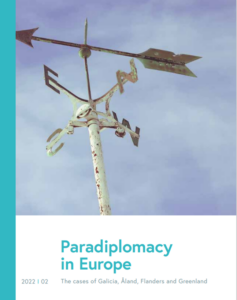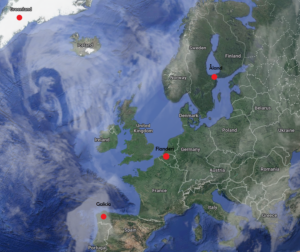This blog follows the recent release of the book Paradiplomacy in Europe. The cases of Galicia, Åland, Flanders and Greenland.
The idea of the “Europe of the regions”, multilevel governance, and the so-called paradiplomacy (Aldecoa and Keating, 2000) of substate governments is something that has less of a shine than what was the case in the late 80s-90s. What has happened with time is the sedimentation and normalisation of both a number practices that can be termed as the “external action” of regional, federal, minority or internal nationality polities.
This has led, on the one hand, to an eventual acceptance of this regional behaviour by the state governments, initially in a tacit way and progressively more explicitly in most cases. Regions, on the other, had to concede that the scope of how far a substate government could go on the international stage autonomously from its central government is limited.

Figure 1 – Paradiplomacy in Europe. The cases of Galicia, Åland, Flanders and Greenland
Even in the sheltered environment that is the European Union (EU), with a significant transfer of sovereignty towards the EU level, the paradigm of multilevel governance has by no means altered the fundamental nature of the EU as an Union of sovereign states. However, it has inspired the adoption of a range of participatory practices it, including the largest pooling of sovereign powers anywhere in the world.
Still, European regions and other substate polities do engage internationally and indeed most particularly within the EU. To take stock of these practices, the Coppieters Foundation and Fundación Galiza Sempre, from Galicia, commissioned the short book “Paradiplomacy in Europe. The cases of Galicia, Åland, Flanders and Greenland” to the Instituto Galego de Análise e Documentación Internacional (IGADI) the 30 year-old foreign affairs Galician think tank, an independent, non-governmental research body on international issues that is a rarity outside state capitals anywhere in Europe (fig 1).
Focusing on Galicia, Åland, Flanders and Greenland
The authors of this freely available online, introductory book, Daniel González Palau, Serafin Pazos-Vidal, Marola Padin Novas and Tamara Espiñeira chose to focus in Galicia, Åland, Flanders and Greenland because these four cases combine almost the whole spectrum of ethnic and institutional characteristics that could be find among the sub-state polities that are meaningfully active outside their state borders.

Figure 2 – Case study regions
Galicia is a historic nationality recognised as such by the Spanish constitution, with an official language of its own that is closely linked to Portuguese and still spoken by a relative majority of the population but with a clear process of assimilation towards Spanish and Spain mainstream culture. This happens despite having a 40 year old autonomous government with significant powers and indeed a very large first and second generation and traditionally well organised diaspora in mainland Spain, Latin America and Europe that is almost as large as the resident population of 2,7 million, and which sometimes decides Galician elections.
Flanders, by contrast, is formally a region but also a federal unit of Belgium where over the last half a century moved from being an acculturating ethic group in a traditionally French-speaking state to be an entirely self-sustaining polity and almost monolingual ethnic group within Belgium, where they are indeed the majority of the population. They speak Flemish dialects but the written and formal spoken language is Dutch. Flanders is also unique as it has the “in foro, interno externo” gives its government ample powers of foreign representation on its own right.
Åland is an Finnish archipelago in between the mainland and Sweden and which is monolingual in Swedish. It is a vivid reminder of the Swedish centuries-old presence and influence in what became Finland, alongside the 5% Swedish slowly dwindling speaking minority in continental Finland, as the latter has significant cultural rights but, unlike Åland, no ethnic- and territorially-based self-government. Thus, Åland as the only region with legislative powers (REGLEG) in Finland in order to advance its interest abroad it is able to benefit from the fact of having no competition (unlike Galicia among the 17 Spanish autonomous communities) and from the consensus-building nature of the Finnish state.
Greenland is technically part of North America and not part of the European Union, despite the fact that it is under Danish sovereignty. It has significant self-government despite the small size of the Indigenous Greenlandic population and it is increasingly at the centre of the global geopolitics increasingly being played in the Arctic.
Thus, as the study finds, the ability for these governments to project presence (more often that influence) abroad is shaped by both their internal consistency (Galicia is more divided than Flanders, Greenlandic society is less cohesive than that of Åland) and the attitude of the state that respectively holds suzerainty over them. Quite clearly, the influence of Flanders in shaping Belgian foreign policy and the ability of having a fully-fledged foreign policy of its own, and, to a lesser extent, the ability of Åland to shape Finnish foreign and in particular EU policies is more tangible than what is the case of Galicia and Greenland. In both Galicia and Greenland, their titular states have been traditionally very centralised and still have difficulties in accommodating intergovernmental relationships.
Role of regions in decision-making at the EU level
However, what all these cases share is a willingness to exercise projection abroad, no matter if the ruling parties are openly nationalistic (or at least strongly regionalist) or even if they are strongly unionist (as in the case of Galicia, governed almost uninterruptedly by the conservative People´s Party, the main Spanish right-wing party of which Galicia has traditionally been one of its strongholds).
That said, this regional aim to be present abroad should be taken with a grain of salt. As many authors that have studied subnational mobilisation, particularly in Europe, such as Donas and Beyers (2013), Tatham and Thau (2014), Van Hecke, Bursens and Beyers (2016) would say, “you´ll never lobby alone” in the EU. First, because many regions and their central governments realised around the time of the European Convention (2001-2003) that it was in the interest of both central and territorial governments to have internal procedures to ensure participation at EU level decision-making (Austria, Italy, Germany). When acting at the EU level, regions tend to cluster in national or thematic networks and coalitions (as predicted by Hooghe and Marks, 2003). Furthermore, the existence of the EU Committee of the Regions is both a blessing and curse as it positively provides a formal channel to exercise advisory influence in EU decision making but it negatively shapes and narrows down the scope of individual region´s participation (Piattoni and Schönlau, 2015). A key example is the disproportionate role that the CoR has in shaping the Parliament negotiating position in the EU regional funds (Wobben, 2022).
Lastly, even if the literature has focused on the international mobilisation of “regions” an insufficiently unexplored aspect is the ability of local governments, particularly national associations of municipalities and/or big cities to shape national policies towards the EU and beyond. To illustrate this, IGADI has also published a special bilingual number of its “Tempo Exterior” journal where it considers the experiences of Austrian, Dutch and German local governments influence in national policymaking towards the EU and directly in Brussels. Some of the findings illustrate that it is possible to exercise equal or even more influence than the above-mentioned and many of the other REGLEG. It is a matter of capacity, access, interest and knowledge.

Serafín Pazos-Vidal (Twitter @SerafinPazos) is Senior Expert, Rural and Territorial Development at the European Association for Innovation in Local Development. He is research fellow at the Galician Institute of Analysis and International Documentation (IGADI). He holds a PhD on European Union and has extensively published works on subsidiarity, multilevel governance and EU cohesion policy.
Are you currently involved with regional research, policy, and development? The Regional Studies Association is accepting articles for their online blog. For more information, contact the Blog Editor at rsablog@regionalstudies.org.